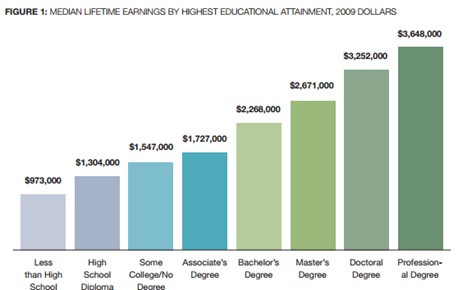Nearly half of students fail to earn their college degree because of the cost of attendance. One of those students was Tammie R. Lopez from California’s San Fernando Valley. After a year of college, Lopez lost some of her financial aid due to the recession. She currently works a full-time job while attending classes at a local community college but, surprisingly, her job may be her ticket to obtaining her bachelor’s degree. Lopez is a barista at Starbucks and is now eligible to receive free tuition to complete her degree online.
Starbucks College Achievement Plan
Starbucks recently introduced their College Achievement Plan, a partnership with Arizona State University to assist current employees to earn their college degrees through ASU’s online program. ASU offers 40 degree options through its growing online education program. Depending on the number of credits that students have earned prior to attending ASU online, Starbucks employees may receive partial or full tuition reimbursement. Starbucks has made the program available to all of its 100,000 plus employees. Forbes estimates that if even just 3 percent of Starbucks workers sign up for the plan, it would cost the company $50 million annually. ASU has clarified that, “Partners admitted to ASU as a junior or senior will earn full tuition reimbursement for each semester of full-time coursework they complete toward a bachelor’s degree. Freshmen and sophomores will be eligible for a partial tuition scholarship and need-based financial aid for two years of full-time study.”
In many respects the policy is a win-win for Starbucks and its employees. The program counts as an employee benefit, allowing Starbucks to gain a massive tax write off that should account for most of its costs. They also believe the program will contribute to their brand, lower attrition, increase employee performance and attract high caliber candidates.
Virtual Degrees and Lifetime Earnings Potential

Source: The College Payoff: Education, Occupation, and Lifetime Earnings
Ultimately the market will decide how to value an online bachelor’s degree from ASU. Predicting how much students will benefit is difficult, but data on the value of other degrees (see graph above) allows for an informed guess. Numerous studies have demonstrated that people with higher degrees tend to earn more over the course of their career. The gap in median lifetime wages between a person with a High School Diploma and a traditional Bachelor’s Degree is $964 thousand. If a virtual bachelor’s degree decreased the typical lifetime earning gap by only 10 percent then it would still improve the lives of many students. In such a scenario the average person would earn nearly $100 thousand more over the course of a 40 year career and earn about $2,400 more each year.
Many students today need to work full-time to afford going back to school. Attending a brick and mortar college can be a logistical nightmare for those living in poverty. Even if the effect of the Starbucks College Achievement Plan is small it can have an outsized impact on the lives of real people.
Kevin Risser Contributed to this Post


Commentary
How Valuable is a Virtual Degree?
August 14, 2014